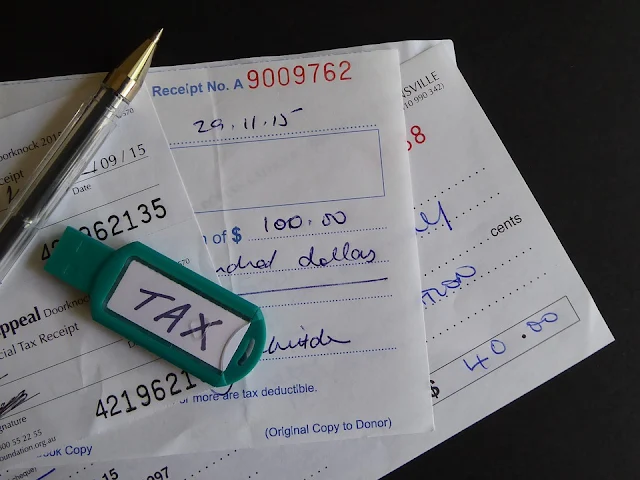Ad Code
Translate
Smart strategies for trading on crypto exchanges
October 20, 2025
Five Do’s For a Healthy Turnover That Bolsters Talent-Retention
October 20, 2025
Discover Honeybee Pharmacy (2025 Guide Important Consumer Tips)
October 14, 2025
What is Ozempic (semaglutide)? (Updated in 2025)
January 30, 2025
How To Find Suitable Properties In Cyprus?
October 20, 2025
Posture Bra: Improving Back Support and Comfort
October 20, 2025
10 Effective Strategies to Improve Domain Authority of Your Website
October 20, 2025
What Does It Mean To Have Taxation Without Representation?
Khabza Mkhize
February 21, 2021
Citizens have the obligation of paying taxes to the government. However, tax can be so complex, and you may need the help of tax experts. At Tax Shark, you can get help with tax relief, tax planning, tax preparation, and Tax Audit defense. Taxes are the primary source of government revenue used to carry out essential services. When the citizens elect leaders of the government, they represent them on how the taxes are spent. On the other hand, taxation without representation is when people pay tax to the government, but they are not represented in the government.
The Origin of Taxation Without Representation
One of the causes of the American Revolution was the opposition to taxation without representation. In the 1760s, the British introduced the unpopular tax to recoup losses experienced during the seven years of war between 1756 and 1763. The Stamp Act of 1765 was the most despised because it required all the colonies to pay taxes on documents created or used within the colonies, and they had to affix an embossed stamp on all documents as evidence of tax payment.Americans immediately protested against the taxation, arguing that taxation without representation was illegal. Nine of the British representatives later met for the Stamp Act Congress in New York. After the meeting, Congress sent representatives appealing against the Stamp taxation. Britain later revoked the Stamp Act due to pressure.
In 1767 Townshend Act was passed that allowed taxation on only tea, paper, and glass. While the colonies struggled to fight against these taxations, Britain responded by imposing acts of suppression such as martial law. The many taxes imposed made the colonies boycott goods from Britain that eventually led to the American Revolution and the independence on 4th July 1776.
Is there Taxation Without Representation Today?
An example in the modern-day world is the District of Columbia, where they do not receive full Representation in Congress but still pay taxes to the federal government. The District of Columbia (DC) is the country's capital with only one delegate in the house of representatives with limited voting privileges. The one delegate has a marginalized role in the Congress, and the residents of DC are not represented in the same way to other states. However, Congress has the power to impose taxes on the residents of DC.The District of Columbia residents have been speaking about taxation without representation for years, but nothing has changed. In 2019, they brought up the issue, but the bill was opposed.
Similarly, Puerto Rico residents do not have a representative in Congress and do not participate in the presidential election, despite being US citizens.
History of Taxed Without Representation
After independence, not everyone in the US was allowed to vote, only the property owners could vote. In 1870, African American men received the right to vote after the constitution's amendment. Furthermore, 50 years later, women became eligible to vote. All along, these groups of people were paying taxes without representation. Besides, some states or countries do not allow prisoners or people with a history of crime to vote, and this can be a form of taxation without representation because they are not allowed to choose their representatives.Taxation without representation was one of the significant factors that led to America's independence. Today, the people who live in the District of Columbia who have no full representation are not protected by any law. Besides, the Supreme Court in Loughborough v. Black's case in 1820 declared that Congress has the right to impose taxes on the District of Columbia residents.
Conclusion
An example of taxation without representation can be explained using a scenario where a family member is expected to contribute to paying bills. Every time a family meeting is held, you cannot discuss how the expenses are allocated or managed, but you must contribute to settling any bill. In this scenario, the member of the family feels oppressed. This situation is like taxation without representation. Instead of shutting them out of the meeting, they should be given a chance to voice their opinion. The victims of taxation without representation don't get an opportunity to be represented in Congress.Some DC residents have used the phrase in their cars' license plate to increase awareness that they pay federal taxes, although they do not have voting representatives in Congress. In 2017, the DC's city council members modified the famous slogan and coined the term "End taxation without representation."
Featured Post
DL Mining Launches Ethereum Contract Participation Service, Helping Users Earn $2K Stable Daily Returns
Zizo Gala-Mkhize-
October 20, 2025
Soapie Teasers
Sister Sites
Most Popular
List of 6,000+ Dofollow Commentluv Blogs FREE (Updated 2025)
January 16, 2025
Five Do’s For a Healthy Turnover That Bolsters Talent-Retention
October 20, 2025
How To Choose The Right Place For A Winter Campsite
March 06, 2023
Popular posts
List of 6,000+ Dofollow Commentluv Blogs FREE (Updated 2025)
January 16, 2025
Five Do’s For a Healthy Turnover That Bolsters Talent-Retention
October 20, 2025
How To Choose The Right Place For A Winter Campsite
March 06, 2023
Footer Menu Widget
Created By Blogspot Theme | Distributed By Gooyaabi Templates


Social Plugin